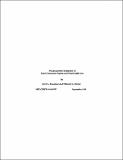| dc.contributor.author | Hausman, Jerry A. | en_US |
| dc.contributor.author | Newey, Whitney K. | en_US |
| dc.contributor.other | Massachusetts Institute of Technology. Center for Energy and Environmental Policy Research. | en_US |
| dc.date.accessioned | 2009-12-16T00:00:49Z | |
| dc.date.available | 2009-12-16T00:00:49Z | |
| dc.date.issued | 1993 | en_US |
| dc.identifier | 93014 | en_US |
| dc.identifier.uri | http://hdl.handle.net/1721.1/50211 | |
| dc.description.abstract | We apply nonparametric regression models to estimation of demand curves of the type most often used in applied research. From the demand curve estimators we derive estimates of exact consumers surplus and deadweight loss, that are the most widely used welfare and economic efficiency measures in areas of economics such as public finance. We also develop tests of the symmetry and downward sloping properties of compensated demand. We work out asymptotic normal sampling theory for kernel and series nonparametric estimators, as well as for the parametric case. The paper includes an application to gasoline demand. Empirical questions of interest here are the shape of the demand curve and the average magnitude of welfare loss from a tax on gasoline. In this application we compare parametric and nonparametric estimates of the demand curve, calculate exact and approximate measures of consumers surplus and deadweight loss, and give standard error estimates. We also analyze the sensitivity of the welfare measures to components of nonparametric regression estimators such as the number of terms in a series approximation. | en_US |
| dc.description.sponsorship | Supported by the NSF. | en_US |
| dc.format.extent | 41 p | en_US |
| dc.publisher | MIT Center for Energy and Environmental Policy Research | en_US |
| dc.relation.ispartofseries | MIT-CEEPR (Series) ; 93-014WP. | en_US |
| dc.title | Nonparametric estimation of exact consumers surplus and deadweight loss | en_US |
| dc.type | Working Paper | en_US |
| dc.identifier.oclc | 35721008 | en_US |
